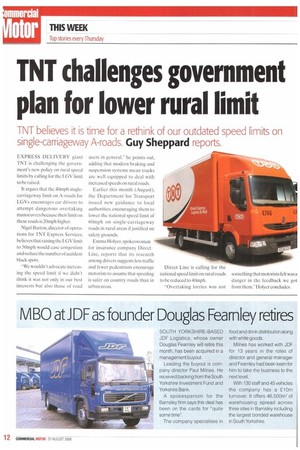TNT challenges government plan for lower rural limit
Page 12

If you've noticed an error in this article please click here to report it so we can fix it.
TNT believes it is time for a rethink of our outdated speed limits on
single-carriageway A-roads. Guy Sheppard reports.
EXPRESS DELIVERY giant TNT is challenging the government's new policy on rural speed limits by calling for the LG V limit to be raised.
It argues that the 40mph singlecarriageway limit on A-roads for LGVs encourages car drivers to attempt dangerous overtaking manoeuvres because their limit on these roads is 20mph higher.
Nigel Barton, director of operations for TNT Express Services. believes that raising the LGV limit to 50mph would ease congestion and reduce the number of accident black spots.
"We wouldn't advocate increasing the speed limit if we didn't think it was not only in our best inlerests hut also those of road users in general." he points out, adding that modern braking and suspension systems mean trucks are well equipped to deal with increased speeds on rural roads.
Earlier this month (August), the Department for Transport issued new guidance to local authorities, encouraging them to lower the national speed limit of 60mph on single-carriageway roads in rural areas if justified on safety grounds.
Emma Holyer, spokeswoman for insurance company Direct Line, reports that its research among drivers suggests less traffic and fewer pedestrians encourage motorists to assume that speeding is safer on country roads than in urban areas. Direct Line is calling for the national speed limit on rural roads to be reduced to 40mph.
"Overtaking lorries was not something that motorists felt was a danger in the feedback we got from them." Holyer concludes.


















































































































































































